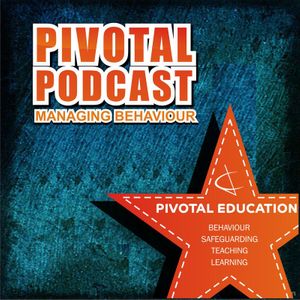Everol Halliburton – Skills from the sharp end – tough kids meet terrific adults – PP95
Pivotal Podcast - A podcast by Pivotal Education

Categories:
It was an amazing experience to speak to Everol Halliburton this week. Everol has worked at the Bridge Alternative Provision Academy for several years. He started his career working as a youth worker and started working in mainstream schools which led to being asked to work in a Pupil Referral Unit. He is now the TBAP Student Services Lead and a Specialist Leader of Education which means he does a lot of training around behaviour management topics such as attachment theories and brain development. What are the positive aspects of working in Alternative Provision? For Everol, it’s all about advocacy and being able to engage with some of the mainstream schools he was working with when he was involved in informal education work. He wanted to help them to experience some of the alternative ways he was working with learners and the success he was having. Everol loves working with young people who feel let down by the education system and giving them a sense of hope. He helps them to readjust their mindset away from the negative. He says: “I don’t believe in luck. When the opportunities arise, you need to be ready.” Everol helps young people manage critical instances positively and reconnect with success – it might be a winning a prize, getting some form of accreditation, passing an exam – things they didn’t think the could do. This involves a huge amount of emotional support on top of the academic – giving them experience of an exam situation, for example, and allowing them to fail with the knowledge that the staff are there to support them. They practice – get it wrong – practice – get it wrong and then eventually get it right. What advice does Everol most commonly give? The relationship is key. This is advice applicable to all – parents, teachers, mentors, learning support professionals. Every behaviour has a message which needs to be understood. It’s much more difficult to dissect or understand that message if there is no relationship. For parents it’s about understanding the social dynamic – the fascination of social acceptance by peers but at the same time making sure the young people know you are there to stand by them. However cool or hard them seem, young people want and need boundaries. There is a search for autonomy in adolescence which needs to be understood but adults need to be there to help, to correct them when they get it wrong – which they will definitely do. The worst thing adults can do is to leave young people to their own devices or to the devices of their friends. For teachers it’s very much the same. Build that relationship because what else do you have when the learning breaks down in your classroom? If you have a link to the learner through your relationship, you can use that to re-focus them and it will naturally limit the off-task, disruptive behaviour. Try to appeal to their own, internal frame of reference. If you can relate to what they have experienced and show that to them, it will make a huge difference. Learning mentors and learning support professionals have a different set of demands on learners but the power of relationships is the same – we can only enforce boundaries and demands if we have the right relationship. How do you balance therapeutic approaches and behaviour management? This depends on the kind of relationship you have and… Links mentioned: Licensed to Hug: How Child Protection Policies are Poisoning the Relationship Between the Generations and Damaging the Voluntary Sector Tweeter of the Week